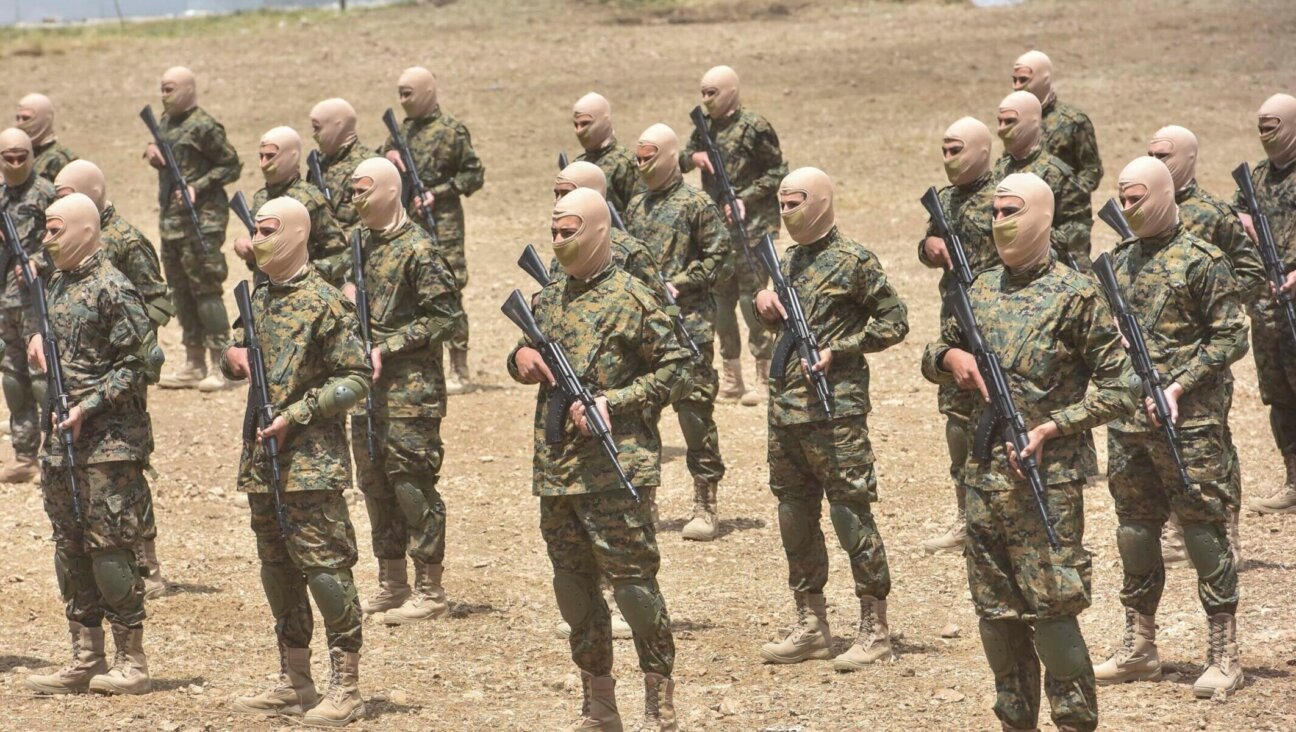How Marvin Miller Led Players Union and Changed Baseball Forever

Labor Day: Miller with Steelworkers’ president David McDonald. Image by getty images
Marvin Miller, Baseball Revolutionary
By Robert F. Burk
University of Illinois Press, 352 pages, $35
This stately, well-researched study raises the question of which is more enduring, anti-Semitic hatred or the loathing — even after death — felt by plutocrats forced against their will to treat their workers fairly. Robert F. Burk, an emeritus professor of history at Muskingum University in Ohio, has previously published studies of sports team owners who tend to be exposed to the full glare of publicity only when a Donald Sterling-type scandal breaks out.
“Marvin Miller, Baseball Revolutionary” examines how the American Jewish players’ representative so changed the sport of baseball that he has been ranked among the top three most influential people in the history of the game, alongside Babe Ruth and Jackie Robinson. As executive director of the Major League Baseball Players Association from 1966 to 1982, Marvin Miller corrected what in the mid-1960s were unfair working conditions in terms of salary, retirement pensions, and the freedom to be traded to other teams. By educating players about fair labor practices, he helped build one of the strongest unions in America, which in 1968 negotiated its first collective bargaining agreement with team owners, increasing minimum annual salaries from a paltry $6,000, the first such increase in 20 years. By doing so, he permanently antagonized baseball owners to the point where, even today, he has still not been voted into the Baseball Hall of Fame.
Miller fought the establishment, represented by baseball commissioner Bowie Kuhn, to stop the form of bondage called the “reserve clause,” which allowed teams to pay low salaries and prevent players from going elsewhere to get better pay. In the 1972 Supreme Court case Flood v. Kuhn, named after the outfielder Curt Flood, the labor side lost, but after a few more years, the reserve clause would indeed be abolished. Brad Snyder’s “A Well-Paid Slave: Curt Flood’s Fight for Free Agency in Professional Sports,” points out that Miller’s “strategy, as head of the players’ association, was to let the players run the organization. His job was to give them the most information he could give them. Using his experiences as a labor leader, he showed them the benefits of being united and that what they could accomplish collectively was greater than a bunch of individuals. He was an educator.” In 1983, Peter Seitz, the arbitrator who would be instrumental in doing away with the reserve clause in 1975, explained in a letter to The New York Times that Miller was the “Moses who had led Baseball’s Children of Israel out of the land of bondage.”
The art of lively, inspired negotiation was natural to Miller, who was born in Brooklyn; his father, a garment salesman put on tefillin to daven every morning. As he wrote in his 1991 autobiography, “A Whole Different Ball Game,” Miller disagreed with his father’s requirement that at age 10, he had to start Hebrew school to prepare for his bar mitzvah. With his mother serving as arbiter, it was resolved that starting six months before the date of his bar mitzvah, Miller would be home-tutored. His father was not satisfied with this compromise, lamenting, “You’re not even going to be able to say Kaddish!” but Miller had won his first series of negotiations.
After graduation from James Madison High School, where fellow alumni would include the Supreme Court Justice Ruth Bader Ginsberg, the novelist Irwin Shaw (born Irwin Shamforoff), and the biologist Barry Commoner, Miller first encountered “anti-Semitism of a casually cruel nature,” Burk notes. His alma mater, Miami University in Ohio, had students who, upon hearing that Miller was from New York, immediately assumed he must be Jewish and asked, “You get everything wholesale, right?” Miller observed that in some respects, African-American students were treated even worse than Jews, banned from campus housing and restaurants. Miller tried to protest these conditions, to no avail.
Miller’s university experiences in Ohio were echoed when, as an economic adviser negotiating contracts for the United Steelworkers, he moved his family to a Pittsburgh suburb where his son Peter “experienced occasional anti-Semitism at his neighbourhood school, including a Catholic classmate tossing the epithet ‘Kike’ at him.” This time, rather than fight, Miller and his mishpacha changed school districts. Yet by 1966, when Miller was elected executive director of the Major League Baseball Players Association, he was inured to hearing that at an owners’ meeting, Walter O’Malley, long-time owner of the Brooklyn/Los Angeles Dodgers team, yelled about Miller: “Tell that Jewish boy to go on back to Brooklyn.”
“Marvin Miller, Baseball Revolutionary” adds that “other club officials privately referred to Miller as “that gimpy-armed Jew bastard.” Referring to a birth defect that resulted in a withered right arm, this insult points to the enduring ulcerated loathing of Miller among the power elite who determine who gets into the National Baseball Hall of Fame in Cooperstown, New York.
Ostensibly meant to honor those who had the greatest impact on the game, Cooperstown has accepted such uninspired players as the catchers Roger Bresnahan and Ray Schalk and the first baseman “High Pockets” Kelly. More to the point, in April 2003, one month after the start of the Iraq War, a planned event at the Hall to commemorate the 15th anniversary of the 1988 baseball movie “Bull Durham” was notoriously cancelled by the Hall’s president because two of the film’s stars, Tim Robbins and Susan Sarandon, were against the war. The Hall’s then-president Dale Petroskey justified his partisan political initiative by informing Robbins and Sarandon by letter: “We believe your very public criticism of President Bush at this important — and sensitive — time in our nation’s history helps undermine the U.S. position, which ultimately could put our troops in even more danger.”
This ambient atmosphere would naturally not welcome the memory of advances for athletes, and Miller did not waste much time regretting it. In the early 1980s, after his retirement at age 65, following a heart attack brought on by overwork and a three-pack-a-day cigarette habit, his skill at collective bargaining drew job offers from the Northeast Conference of Rabbis, airline hostesses, and Playboy bunnies, among others. Instead he opted to be an ad hoc adviser on sports labor issues.
As he grew older and his name was repeatedly rejected for admission in Cooperstown (the next opportunity will be with the 2017 entrants), Miller seemed to associate his pariah status with the by-now familiar pattern of prejudice he had encountered during his long life. The hate speech came from expected sources, such as his longtime adversary Bowie Kuhn, who in his 1987 memoir “Hardball” wrote despisingly: “There was about Miller a wariness one would find in an abused animal. It precluded trust or affection.”
During a 2008 interview, Miller — the abused animal himself — suggested: “After I’m dead, they can induct me and put an asterisk on my plaque, with a footnote: ‘But let’s not forget he was Jewish.’”
Benjamin Ivry is a frequent contributor to the Forward.
A message from our Publisher & CEO Rachel Fishman Feddersen

I hope you appreciated this article. Before you go, I’d like to ask you to please support the Forward’s award-winning, nonprofit journalism so that we can be prepared for whatever news 2025 brings.
At a time when other newsrooms are closing or cutting back, the Forward has removed its paywall and invested additional resources to report on the ground from Israel and around the U.S. on the impact of the war, rising antisemitism and polarized discourse.
Readers like you make it all possible. Support our work by becoming a Forward Member and connect with our journalism and your community.
— Rachel Fishman Feddersen, Publisher and CEO























